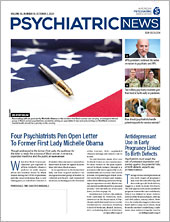We live in dark times. A global pandemic, national economic collapse with tens of millions unemployed, social unrest related to video evidence of systemic racism, a divided national government struggling to act and lead, and widespread concern that such foundations of American democracy as the right to vote, equal protection under the law, and the primacy of law and order are at risk. We and our patients are not immune to the impact of these dark times, which enter the therapy consulting room, including the virtual space in which much therapy now occurs. In such dark times, the concept of moral injury offers a helpful lens for understanding what we and our patients are struggling with.
The concept of moral injury has its origins in reactions to wartime atrocities. Litz and colleagues defined moral injury as intense psychological distress resulting from “perpetrating, failing to prevent, bearing witness to, or learning about acts that transgress deeply held moral beliefs and expectations.” When a moral code that we have joined is violated by us or by others, or by those we depend on to uphold that moral code, we feel that violation as distress that may be substantial. Moral injury is not limited to war experiences but may also be part of employment and other social experiences. Moral injury is not itself a mental disorder; it is a transdiagnostic phenomenon associated with negative thoughts about oneself or others, including shame, anger, disgust, and guilt and may be relevant regardless of diagnosis.
I propose that moral injury is ubiquitous in these dark times because much of what we are confronting on a large scale is potentially inconsistent with our moral code. In relation to the pandemic, it is easy to imagine moral injury as an issue for those making triage decisions or tending to the emergently ill or to populations at risk. Assigning ventilators, personal protective equipment, testing supplies, and access to a vaccine and other limited resources, with life and death at stake, includes the potential for experiences of violation of our moral code regardless of the practical exigencies that may require such decisions to be made.
Violation of our moral code is also at play in social unrest related to systemic racism, tribal politics, government leadership impasse, and to concerns about American democracy. This is not to suggest, as President Trump did about the white nationalist rally in Charlottesville, Va., that “[t]here are good people on both sides,” but more basically that there are simply people on both sides, many of whom have joined a moral code that shapes their subjective experience of events. Those who have joined a moral code are more likely to experience moral injury than those who have not, and they are more likely to seek psychotherapy to help manage their distress. Some are appalled by violation of their moral code emphasizing social justice and equal protection under the law when they see repeated evidence of anti-Black racism in police or other organizational practices. Others may react with moral injury when they witness or fail to prevent a breakdown of law and order when peaceful protest erupts into looting, destruction, and assault.
It is the role of parents and spiritual and political leaders, but not of therapists, to advocate for a particular moral code. The role of therapists, regardless of theoretical orientation, is to help individuals who become our patients come to grips with distress associated with moral injury related to violation of their moral code. This is much easier to do when we share our patient’s moral code, but a major countertransference challenge when we do not. The countertransference challenge goes beyond theoretical orientation, as all therapists must contend with their reactions to patients.
Regardless of how our school of psychotherapy conceptualizes these reactions to patients’ moral codes—or fails to—our reactions matter. Although countertransference is a cornerstone of psychodynamic therapy, some other schools also recognize it in different ways. The best defense against unwittingly and unhelpfully acting out our countertransference feelings is awareness of them. This is, by the way, true in relation to awareness of our own unconscious countertransference racism and of the relative balance of privilege between therapist and patient. Regardless of conscious intent, our unconscious feelings are powerful and relevant in our work. Efforts to make the unconscious conscious are essential in managing countertransference, including unconscious racism. This is one reason why personal psychotherapy is useful in training to become a therapist. One result of APA self-scrutiny as it grapples with its own history of systemic and structural racism may be rediscovery in general psychiatry that the unconscious exists and matters a great deal.
Beyond countertransference, though, patients’ transferences to us may be shaped by moral injury. In the midst of a pandemic we may face idealizing transferences that are gratifying (“I appreciate essential health care workers like you so much!”) or quite hard to endure (“You sat this out comfortably doing sessions on Zoom while I risked my life every day working with COVID-positive patients!”). We are well advised to reflect on whether transference idealization may involve resistance to deepening therapy, while we also must avoid refusing unpleasant negative transferences given that part of our role as therapists is to take the transference as it arises.
Other difficult-to-tolerate transferences will be to us as moral injurers. We may be seen (accurately or not) as standing for moral codes that patients feel are inconsistent with theirs. It is a countertransference burden to be experienced in the transference as a corrupt, morally bankrupt authority, but being able to sit with these transferences is part of a dynamic therapist’s role. Refusing the transference by reflexively correcting patients’ transference distortions is not the work of psychotherapy.
During these dark times, it is wise to prepare for these situations by holding in mind the potential role of moral injury in our and our patients’ distress and by creating a space to reflect on our own experiences. Such preparation, as well as supervision or consultation when difficult situations arise, may help ward off burnout and secondary traumatization, as well as improve our capacity to be “with” our patients, which, as much as anything else we do, is what heals, and not only in dark and lonely times. ■

